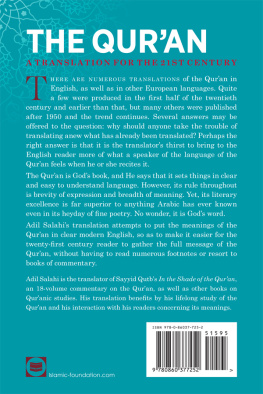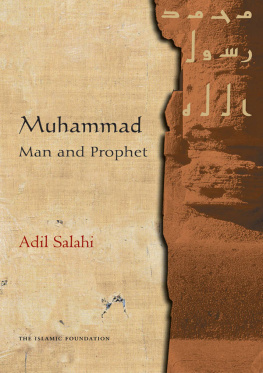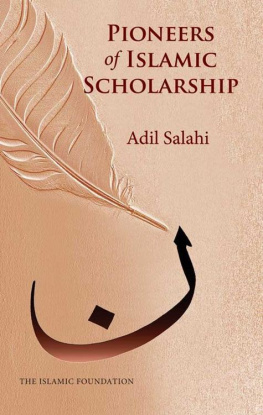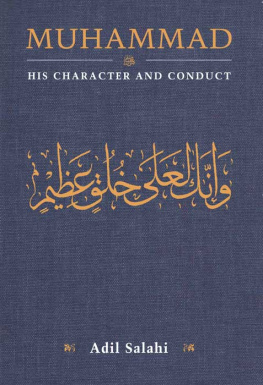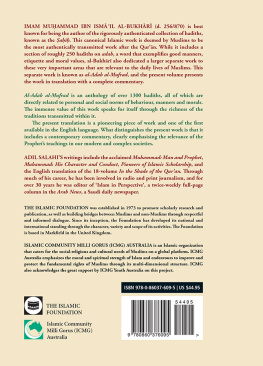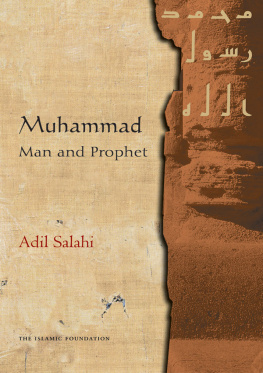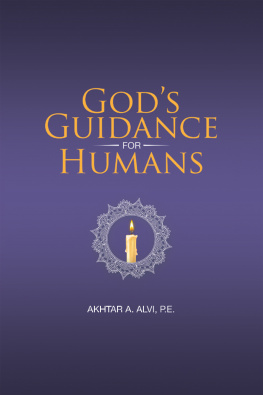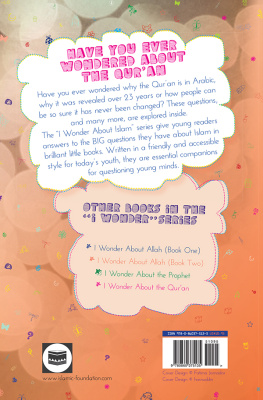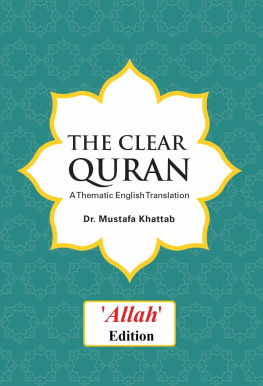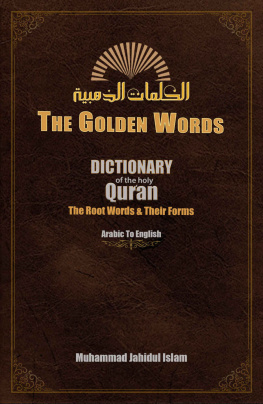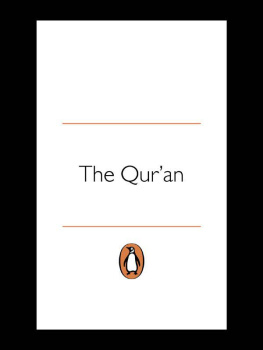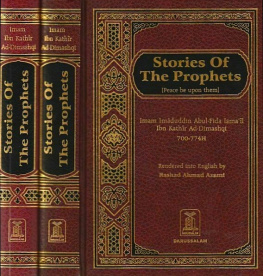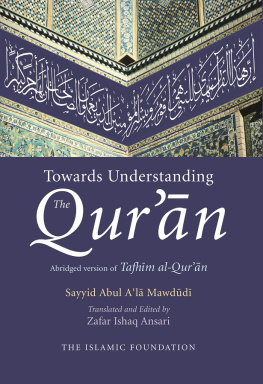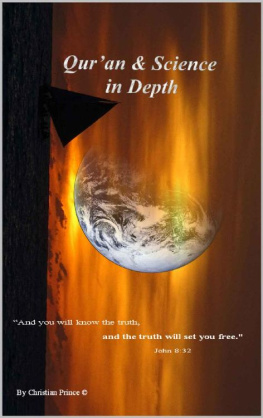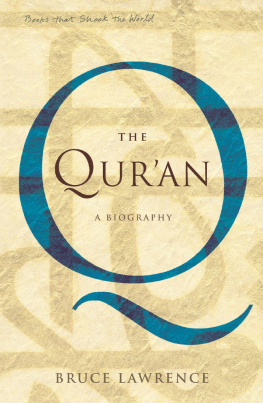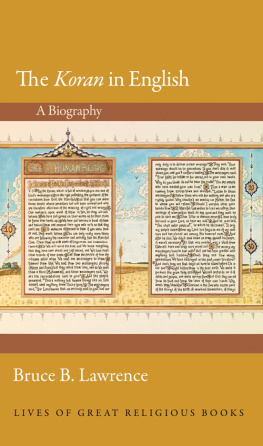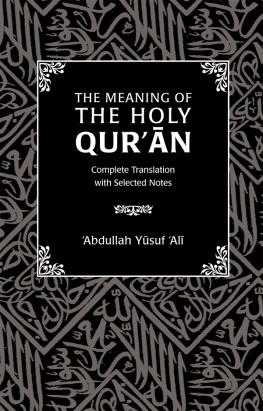

The Quran: A Translation for the 21 st Century
Published by:
THE ISLAMIC FOUNDATION
Markfield Conference Centre, Ratby Lane,
Markfield, Leicestershire LE67 9SY, United Kingdom
E-mail: publications@islamic-foundation.com
Website: www.islamic-foundation.com
Quran House, PO Box 30611, Nairobi, Kenya
PMB 3193, Kano, Nigeria
Distributed by :
Kube Publishing Ltd.
Tel: +44(01530) 249230, Fax: +44(01530) 249656
E-mail:
Copyright Adil Salahi 2019/1440 H.
All rights reserved. No part of this publication may be reproduced, stored in a retrieval system, or transmitted in any form or by any means, electronic, mechanical, photocopying, recording or otherwise, without the prior permission of the copyright owner.
British Library Cataloguing-in-Publication Data
A catalogue record for this book is available from the British Library
ISBN: 978-0-86037-725-2Paperback
ISBN: 978-0-86037-750-4Hardback
ISBN: 978-0-86037-755-9e-book
Typeset by: S4Carlise
Front Cover Calligraphy: Shutterstock
Cover design by: Inspiral Design
Printed by: IMAK offset, Turkey
Table of Contents
The Quran is Gods word which He revealed to Prophet Muhammad through the Angel Gabriel. God had earlier revealed Scriptures to different prophets, including the Torah, the Psalms and the Gospel. The Quran is clearly intended to be Gods final message to mankind, setting out the way of life God wants people to lead. It sets their lives on the right course and ensures their happiness in this world and the next. In this present life, they have through Gods message what satisfies their physical and spiritual needs and gives them a sense of complete fulfilment. Implementation of the Quran in this present life ensures for them admittance into Heaven in the life to come. This means a second life of perfect bliss and happiness, as well as enjoyment of what is even better, namely that God is pleased with them.
The Quran was revealed in parts during the period from the beginning of Muhammads prophethood in 610 to shortly before he passed away in 632. Although the revelations given to Prophet Muhammad (peace be upon him) included much more than the Quran. The Quran is given in Gods own word, while the rest of His revelation was expressed by Prophet Muhammad in his words and style. The two complement each other and together form the Islamic message.
The Quran is Gods own word, and it has been preserved in its original form over the fourteen centuries of Islamic history. This is due, first and foremost, to the fact that God has guaranteed its preservation: It is We Ourselves who have bestowed this reminder from on high, and it is We who shall preserve it intact . (15: 9) When the Prophet received a surah or a passage of the Quran, he immediately dictated it to one or more of his scribes. Many of his Companions memorised it. When he passed away, his successor as head of the Muslim state, Abu Bakr, ordered the collation of a complete copy of the Quran to serve as reference. This was a meticulous exercise completed during Abu Bakrs reign which lasted less than two years. The task was entrusted to Zayd ibn Thabit who had learnt the complete Quran by heart under the Prophets own instruction and guidance. Zayd gathered the written parts together, requiring two independent witnesses to testify that they were present when the Prophet dictated it to the scribe who kept it. Thus, authenticity was perfectly assured through the four people involved up to that point: the scribe, the two witnesses and Zayd, plus the written copy. However, Abu Bakr, [Umar, [Uthman and [Ali, all of whom knew the full Quran by heart, further checked the complete copy. The whole exercise was repeated again less than fifteen years later, when reference copies were produced by a committee headed by Zayd himself and who was helped by three more of the Prophets Companions who also knew the Quran by heart. These copies were checked against the original copy collated during Abu Bakrs reign. A copy was then sent to each of the main cities of the Muslim state, with a reciter who memorised the Quran in full to teach people its proper recitation.
The Quran is recited every day by every Muslim who keeps up his or her prayer. It is recited in prayer and at other times, because its recitation is an act of worship. Millions of people have learned its entirety by heart throughout every generation since it was first revealed 1,400 years ago. Nearly every Muslim memorises parts of it, and most recite a portion of it every day. Those who know it by heart read it in full once a week in order to retain it in their immediate memory. None feels this to be a demanding task, even though it takes at least an hour and a half every day. On the contrary, they approach it with the eagerness of one who feels it adds to their happiness.
No religious book is read and recited or listened to as frequently as the Quran. Yet those who recite it are always eager to do more. The question is whether this is due only to the religious aspect or if there is something more about the Quran? The religious factor is undoubtedly very important, but what is there about the Quran that attracts non-Muslim Arabs to memorise some passages of it? Indeed, some of them read it in its entirety time after time.
We need to remember that the Quran was revealed during a time when the Arabs were very proud of their language and used it so skilfully as to include fine forms of expressive speech. Moreover, they attached great importance to poetry. As they were largely unlettered people, poetry was the way they recorded their history, highlighted their bright moments, expressed their sorrows, extolled the merits of their departed elders, described their happiest events, reviled their enemies and recorded the lessons they learnt through hard experience. They chanted it in their social gatherings, and through poetry their news travelled from one part of Arabia to another. It also served as their formal and social media. What is special about Arabic poetry is that a poem may run into hundreds of lines, maintaining the same metre and rhyme, without giving even a hint of affectation or the rhyming word sounding laboured. In this they benefited by the fact that Arabic is a derivative language, which means that a three-consonant root can generate words in double figures in the forms of verbs, nouns, adjectives and adverbs bearing the same meaning as the root and adding varying connotations.
Furthermore, the root will also provide several more words delivering yet greater subtleties in each instance.
In the tribal society of Arabia, with tribes often raiding each other for plunder or revenge, the rise of a poet was an occasion for great celebration, because he could always highlight the merits of his tribe and revile its opponents. The fact that poetry is easily memorised and survives for a considerable length of time added to its importance.
When Prophet Muhammad (peace be upon him) recited passages of the Quran to the Arabs, in his efforts to advocate his message, they could not place it in any form of speech they knew. For certain, they realised that, despite its use of rhyme at times and having rhythm, it was not poetry. The Prophet appreciated poetry and could distinguish what was fine and what was of low standard, and he listened to some recitals of fine poetry, but he never expressed himself in any form that could be described as akin to poetry. He did not even quote any line of poetry in his speech. Discerning Arabs were quick to recognise that the Quran was of a much superior quality than even the finest of their poetry. Hence, when anyone suggested that his opponents should describe Muhammad as a poet, the suggestion was rejected out of hand. Having listened to two passages of the Quran, al-Mafruq ibn [Amr, the head of the major Arabian tribe, the Shayban, said to the Prophet: What you say is not the word of a human being. Had it been human speech we would have recognised it.
Next page
